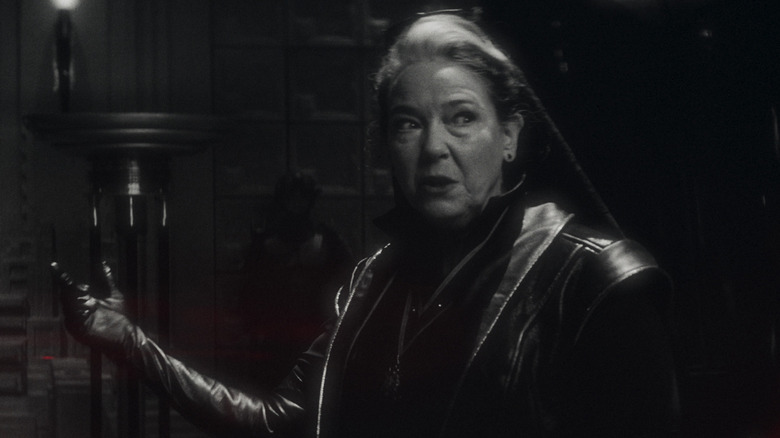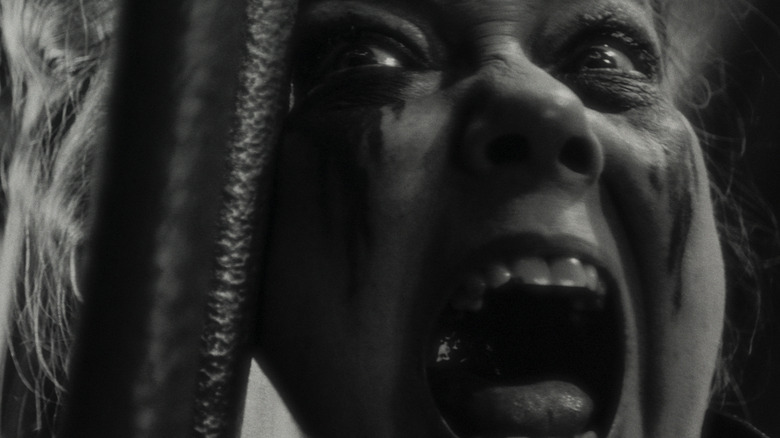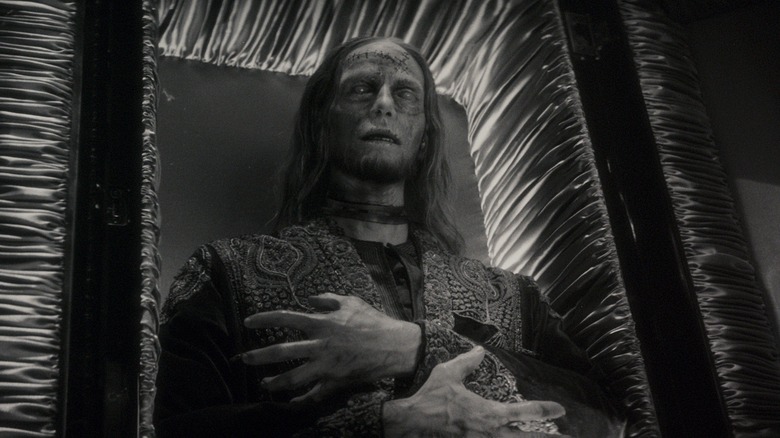How Werewolf By Night Brings The MCU Back To Its Phase One Roots
I know, I know. Once any popular franchise has been around long enough, it's inevitable that an increasingly vocal group of cynics will show up to complain that things just aren't like they used to be. I swear, I'm on your side here! Contrary to conventional trains of thought, change is both necessary and good. No longform narrative can survive by coasting on its initial success, stubbornly clinging to what worked in the past simply because, well, it's what worked in the past. But what if, along the way, the guarantee of success has caused those in charge to lose sight of something crucial and integral to their identity?
The Marvel Cinematic Universe has grown by leaps and bounds, starting from the most humble beginnings with "Iron Man" in 2008 before reaching the first of many crescendos with "The Avengers" in 2012. It might be tempting to look back and dismiss Phase One as quaint and reserved, featuring remarkably more reserved ambitions — Thor was originally introduced as a boring ol' extraterrestrial instead of a god, after all, and now look how far we've come — compared to the downright cosmic concepts and surreal storylines that the MCU has since embraced. But in this case, perhaps there is some truth to the idea that they're simply not making these Marvel movies (and shows) like they used to anymore.
Sometimes, it takes a bold and daring effort to shock both creatives and fans alike out of their collective malaise. "Werewolf By Night" just might be the catalyst for such an awakening, providing a long-overdue boost of imagination and inspiration to truly deliver something we've never seen in this franchise before. In the process, it can't help but remind us how singular, risky, and greater-than-the-sum-of-its-parts the MCU once was during Phase One.
Uninspired inspirations
Has anyone noticed that superhero stories across the board these days almost feel a little ... incestuous? No, we're not talking the literal kind explored in "House of the Dragon" or even "Rick and Morty" lately. But more and more, I've noticed a pernicious tendency among far too many blockbuster productions these days, as if they were made by and for people who watch little else except other superhero media.
Look no further than several comic book movies in recent years that mostly resemble products chasing consumers, rather than art engaging with its viewers. Where "Thor: Ragnarok" was a genuinely inspired shot in the arm, taking its cues from director Taika Waititi's comedic sensibilities along with frighteningly real-world history to radically reinvent its title character, this year's follow-up "Love and Thunder" mostly felt like a watered-down version of "Ragnarok" playing all the same hits we've seen before. For every "Doctor Strange in the Multiverse of Madness," a mixed bag that at least bore director Sam Raimi's distinctive fingerprints all over it, there's a dozen forgettable entries that only seem to exist to further help the snake eat its own tail. Perhaps the nadir of this trend came from the Russo brothers repeatedly cited classics like "The Godfather" or "Se7en" as sources of inspiration for their bloated event films, which even the biggest fans would be hard-pressed to agree with.
The MCU wasn't always like this, however, and "Werewolf By Night" serves as a perfectly-timed reminder of that fact.
Like Phase One, Werewolf By Night is actually about something
Take a trip with me back to the halcyon years of the MCU, when box office success wasn't preordained, risk-taking was a matter of course, and audiences hadn't yet been trained to accept the same old formula wrapped up in slightly different packages.
Once upon a time, "Iron Man" struck gold with its renegade spirit and almost reckless sense of fun. Then "The Incredible Hulk" turned to monster movies and body horror to convey Bruce Banner's internal dilemma with the uncontrollable Hulk. "Captain America: The First Avenger" stands tall as the highlight of Steve Rogers' trilogy thanks to "The Rocketeer" director Joe Johnston's ability to translate and modernize Cap's "Aw shucks" sensibilities for modern audiences. Even 2011's "Thor" benefited from having noted Shakespeare expert and filmmaker Kenneth Branagh lean on the Bard to help craft its tone.
"Werewolf By Night" feels perfectly of a piece with Phase One's impressive grasp of storytelling over shared universe obligations (we don't talk about "Iron Man 2," naturally), thanks in large part to its classical roots and its refreshing focus on simply — stick with me here — crafting a standalone narrative. Composer-turned-director Michael Giacchino wears his love for the Universal monsters on his sleeve all throughout the creature feature, though never at the cost of turning this loving homage into a rote copy of better things. And best of all, the storyline feels compelling enough that at no time do we stray into wondering what the Avengers might be up to.
Admittedly, productions like "Werewolf By Night" should be the bar — not some wild change of pace. But with this one horror special, the MCU finally got back to what made it so entertaining in the first place. Better late than never!


